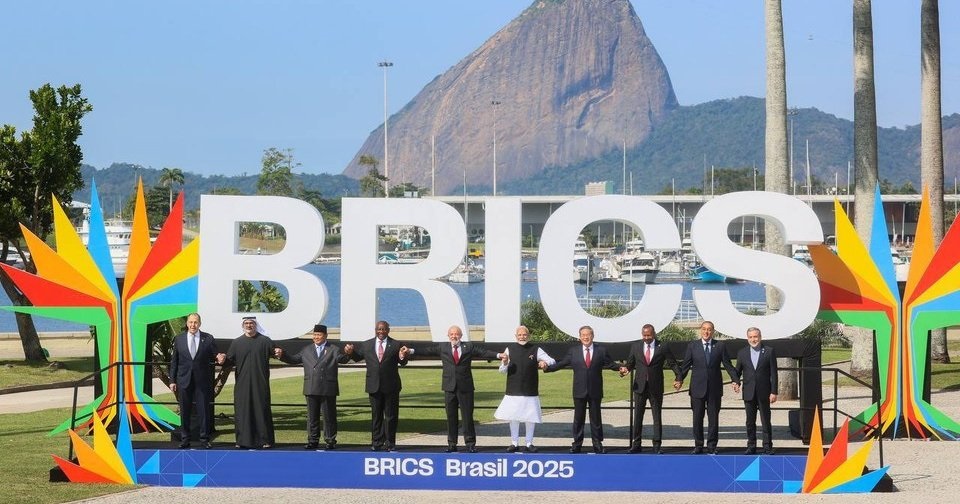 Photo: Bloomberg
Photo: Bloomberg
America’s trading partners are bracing for President Trump to impose new tariffs soon on everything from children’s toys to soybeans. Yet, instead of rushing to strike trade deals with the United States, the world’s largest developing economies have other plans, ‘The New York Times’ stresses.
At a two-day gathering in Rio de Janeiro, members of the BRICS group that includes Brazil, Russia, India, China, South Africa and other nations, vowed to deepen ties and mulled ways they could cut red tape to make it easier to trade with one another.
Without naming the United States or Mr. Trump, the alliance criticized barriers to international trade and defended the right of its member countries, which represent more than 40 percent of the world’s gross domestic product, to retaliate against what officials portrayed as unfair tariffs.
“We voice serious concerns about the rise of unilateral tariff and non-tariff measures, which distort trade,” the group said in a joint statement, calling for “fair” and “inclusive” trading rules, in line with international norms set by the World Trade Organization.
The effort to increase trade within the BRICS group highlights how Mr. Trump’s tariffs are redrawing global economic relations and pushing America’s trading partners to other markets.
It also comes as a 90-day pause on tariffs that Mr. Trump imposed on most of America’s trade partners is set to expire on Wednesday. Despite ambitious plans to broker dozens of trade deals benefiting the United States, Mr. Trump has so far struck only two agreements, with Britain and Vietnam, though administration officials have said he will announce more trade deals this week.
Even as the BRICS group avoided directly pointing a finger at Mr. Trump, its message did not go unnoticed. Mr. Trump threatened on Sunday to impose an additional 10 percent tariff on countries that align themselves with what he called the “anti-American” policies of BRICS nations.
“There will be no exceptions,” Mr. Trump said in a post on the Truth Social.
On Monday, President Luiz Inácio Lula da Silva of Brazil, which hosted the summit, fired back at Mr. Trump. “We don’t want an emperor, we are sovereign countries,” Mr. Lula told reporters. “If he thinks he can tax, countries have the right to tax, too.”
Mr. Lula dismissed the impact of Mr. Trump’s threats of additional tariffs. “Nobody touched on the issue,” he said. “We didn’t give any importance to it.”
China’s foreign ministry said BRICS was “not a bloc for confrontation, nor does it target any country,” while a spokesman for Russian president Vladimir V. Putin said collaboration within the alliance was “not directed against third countries.”
Founded in 2009, BRICS aims to increase the economic and geopolitical influence of the world’s emerging economies. Since then, the group has expanded to include Egypt, Ethiopia, Indonesia, Iran and the United Arab Emirates as full members, and is forging looser partnerships with other countries.
Though BRICS has for years served as a mostly symbolic alliance for countries in the so-called Global South, it has recently tried to forge more concrete cooperation among members.
One recent proposal involves a grains-trading exchange as a counterweight to American and European commodities platforms. The aim of the exchange, which was initially proposed by Russia and may eventually expand to include other agricultural goods, is to reduce reliance on the U.S. dollar and to increase trade among BRICS countries.
Other projects being considered include an alternative international payment system that would allow members to trade using local currencies. It would also give members like Russia a way to sidestep sanctions imposed by the West as a result of Russia’s invasion of Ukraine.
The dominant role of China and Russia in the group, together with the addition of Iran and other members has fueled concerns that the BRICS may be morphing into an anti-Western platform.
Mr. Lula waved away such claims, emphasizing that the BRICS group was a way to balance a global order that has long placed outsized power in the hands of the United States and other Western countries.
“It is a group of countries wanting to create another way of organizing the world,” Mr. Lula said. “Because of this, the BRICS is creating discomfort.”
read more in our Telegram-channel https://t.me/The_International_Affairs

 10:00 09.07.2025 •
10:00 09.07.2025 •






















